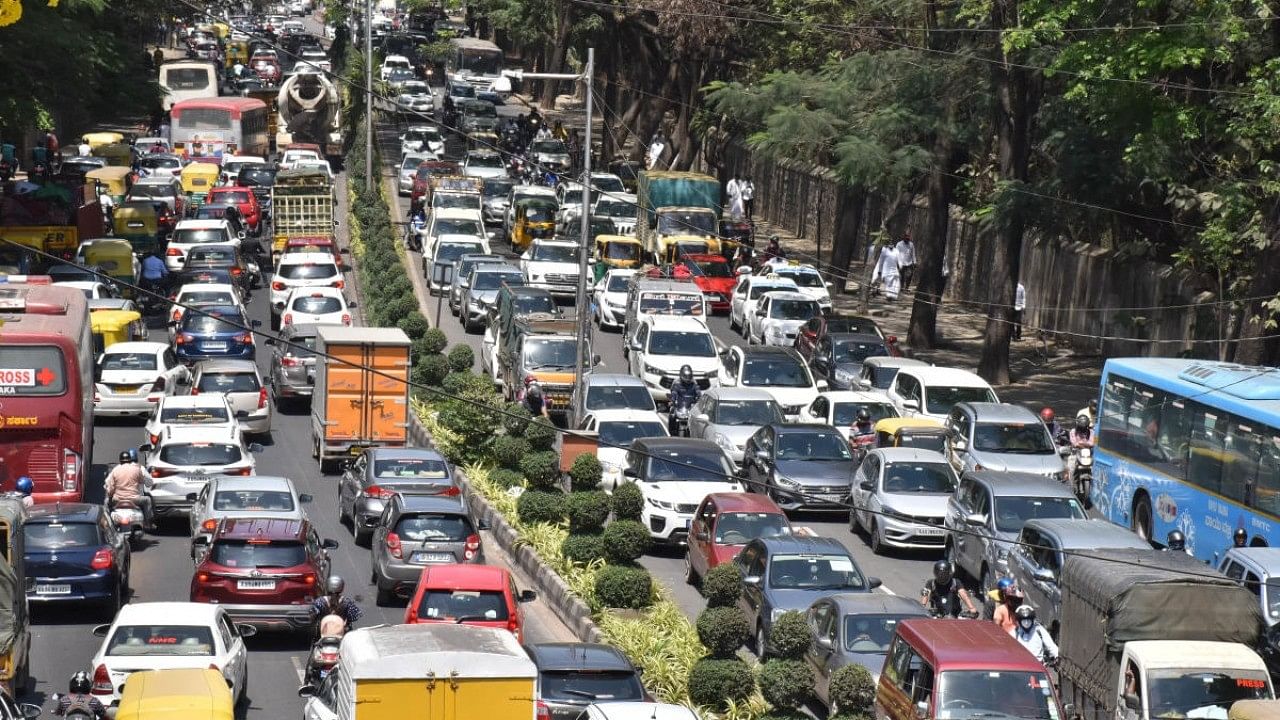
The BMLTA Act was passed in 2022.
Credit: DH Photo
The surge in metro passengers and parking issues around metro stations have led the Bangalore Metro Rail Corporation Limited (BMRCL) to release a draft policy to regulate parking near the stations. While the policy is well-intended, as it aims to ease congestion, it is crucial to understand that a parking policy in itself is not new to Bengaluru. In this case, what remains a point of concern is multiple bodies coming up with their own policies, when this should come under the purview of the Bengaluru Metropolitan Land Transport Authority (BMLTA) which was envisioned to put an end to overlapping of responsibilities created by a multiplicity of institutions and departments.
The first parking policy for Bengaluru was adopted by the Bruhat Bengaluru Mahanagara Palike (BBMP) in 2012. In 2021, the Government of Karnataka approved the Parking Policy 2.0, prepared by the Directorate of Urban Land Transport (DULT) with the intent of ensuring seamless movement of vehicles and people.
Parking Policy 2.0 aimed to provide for organised parking and promoted strict enforcement of parking regulations. This policy, though approved in 2021, is far from implementation. In May 2024, the Karnataka High Court directed the authorities to implement the policy and gave six weeks to the BBMP Commissioner to submit a detailed project report on the methodology. On being asked on a parking policy during the Question Hour in the Monsoon Session, the Karnataka Home Minister emphasised that the city needs a parking policy with both short-term and long-term objectives. Stating that there is no policy, no infrastructure to withstand the surging number of vehicles, and no regulatory mechanism, the minister reiterated that this problem is not of the police department alone but is one that requires greater cooperation between the BBMP and the Transport Department, among other agencies. All of this points to the larger question – why is there no BMLTA, despite a law being passed in 2022?
What is the BMLTA Act and why is it important? The Act provided for the constitution of BMLTA, for the regulation of operation, maintenance, development, and monitoring of urban mobility in Bengaluru. This authority brings within its purview agencies such as Bangalore Development Authority (BDA), Bengaluru Metropolitan Transport Corporation (BMTC), BBMP, BMRCL, and the Transport Department which are responsible for the planning and development of the city in relation to urban mobility. The Act also provides for an executive committee that is responsible for implementation of the decisions of BMLTA.
Closer Coordination for Seamless Mobility
BMLTA is vested with the responsibility to promote seamless mobility in the city by providing a single platform for all the stakeholder agencies involved in mobility planning and envisages coordination on matters of transport and traffic management. The Act consists of comprehensive provisions that delve into various aspects of urban mobility, with a streamlined plan of action to govern parking-related concerns.
Section 20 of the BMLTA Act, 2022, vests the authority with the power to prepare and implement a parking policy in connection with urban mobility. The Authority is mandated to periodically update the policy, in consultation with the urban transport agencies, Urban Local Bodies, traffic management agencies, Urban Development Department, etc. It is also mandated to prepare a traffic management plan, at least once a year.
The Act specifies the powers of BMLTA which include the implementation of traffic management measures such as congestion pricing, parking regulations and the power to recommend, monitor, and advise on charges prescribed for parking. The law is very comprehensive on regulating parking and the fact that the authority is yet to be constituted exacerbates the issue of multiple agencies bringing in their own policies, without effective consultation and coordination with other stakeholders who are relevant to urban mobility planning. There is, of course, a need to formulate a well-structured policy but it needs to be devised in consultation with multiple agencies. The Chennai Unified Metropolitan Transport Agency (CUMTA) – the nodal agency for transport in Chennai – prepared the draft parking policy for the city, in close coordination with agencies and departments involved in urban transport in the Chennai metropolitan area.
If and when it is constituted, BMLTA will pave the way for important conversations around urban mobility, which is the need of the hour. It has been stated that the enactment of the BMLTA Act is the first crucial step. Unfortunately, it remains the only step that has been taken.
(The writer is a Senior Resident Fellow at Vidhi Centre for Legal Policy, Bengaluru)